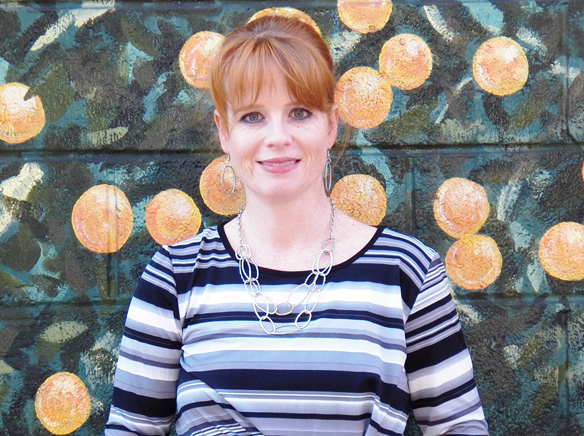Though Amanda Matti seems like an ordinary wife and young mother of two girls, her life story is quite different than many other women her age. The El Cajon resident has served in the Navy and was deployed to Baghdad, Iraq in 2005 as a Foreign Affair Liaison Officer and Intelligence Analyst. That was when and where she met Fahdi Matti, who worked alongside her as a translator in the field, and who would eventually become her husband.
Though Amanda Matti seems like an ordinary wife and young mother of two girls, her life story is quite different than many other women her age. The El Cajon resident has served in the Navy and was deployed to Baghdad, Iraq in 2005 as a Foreign Affair Liaison Officer and Intelligence Analyst. That was when and where she met Fahdi Matti, who worked alongside her as a translator in the field, and who would eventually become her husband.
Matti’s first book, “A Foreign Affair,” is the story about their romance amid the perils of the war in Iraq.
In her second book, “Voicing the Eagle,” released earlier this year, Matti tells Fahdi’s story of what it was like working as a translator, all the while receiving death threats from the Taliban. He would always return home from work to find hand grenades on his doorstep with notes wrapped around them that said, “Stop working for the infidels or we will you and your family.”
“We’ve now been married ten years and have two beautiful daughters so it was all more than worth it in the end,” Matti said.
As with all newlyweds, being married had its own challenges. For the Mattis, this was especially so, since Fahdi had to adjust to life in the United States while coming to terms with his experiences working with the Army and Marines in Baghdad, Fallujah, Ramadi and elsewhere across Iraq.
“He had many fascinating tales from his days on the battlefield and I realized that if I put all these stories together there was a very interesting book there. Not only interesting but also a unique perspective of someone who straddled two worlds–he lived as a U.S. soldier in the American camps for months but he was also a local Iraqi who returned to civilian life in Baghdad on his “vacation days.”” Matti said.
In the meantime, Matti had been reading every Iraq War memoir and book available, and found that there were very few books from the perspective that she and Fahdi had. That motivated Matti even more to write his story.
But like many veterans who have experienced prolonged, intense combat situations, Fahdi has suffered from a degree of PTSD. Talking about some of the more extreme experiences he faced was often unsettling.
There were times when Matti would have to back off for several months and halt her interviews after particularly unnerving conversations that really dug deep into certain memories that were quite painful for him to relive.
“He sat through my questioning and prodding like a champ and did it to make me happy, but it was difficult for him and I had to be careful and know when to stop,” she said.
Matti said that she always had to “set the mood” when she wanted to delve into heavy subject in her interviews with her husband. She would do the interviews in a quiet place, usually on the front porch after the kids were in bed, and tried to make the interviews as close to casual conversation as possible.
There are thousands of local Iraqis and Afghans who served as interpreters for our U.S. military, but hardly anyone is telling their stories, Matti explained.
“These people have not only risked their lives but the lives of their families, and, sadly, many of them have been tortured and slaughtered by the Taliban, Al-Qaeda and other insurgency groups in retaliation for their service to us.
“These interpreters have bled on the battlefield alongside our soldiers and marines and are both directly and indirectly responsible for saving the lives of countless US service members. Many are still living in hiding today, desperate to escape Iraq and Afghanistan and bring their children to safety in the U.S. or anywhere that will grant them safe passage, but they face walls at just about every turn,” she said.
A lot of people ask Matti what the title of her book means.
“The “Eagle” is the U.S. military and the “Vice” is Fahdi. So, essentially, his job was to be the “Voice of the Eagle,” Matti said.
This book is important because it is one of very few that gives a unique perspective of someone who straddles and is loyal to both sides of this war. There are thousands of books that tell of the experiences of American soldiers and marines on the ground in Iraq, and there are even hundreds of books that tell the first or second hand account of Iraqi civilians caught up in the invasion and war. In contrast, Fahdi lived both lives simultaneously.
He was a U.S. Marine in every way except carrying the official title, Matti said. Even in the face of death threats from the Taliban, […] “he remained loyal to his U.S. military brothers, and would have to the death,” Matti said.
For people who read the book and find themselves wanting to reach out to the translators who end up moving here to San Diego County on Special Immigrant Visas to escape the death threats imposed on them, Matti has a suggestion. The San Diego Chapter of No One Left Behind helps resettle and support more than 400 families from Iraq and Afghanistan. For more information on donating or volunteering with the organization, email Amanda Matti directly at Mandy@NoOneLeft.org.














